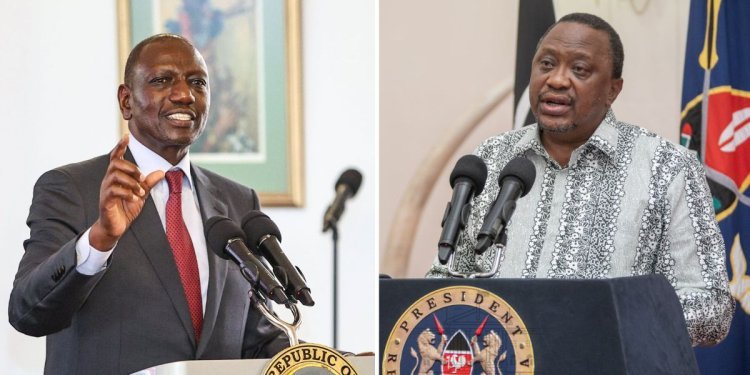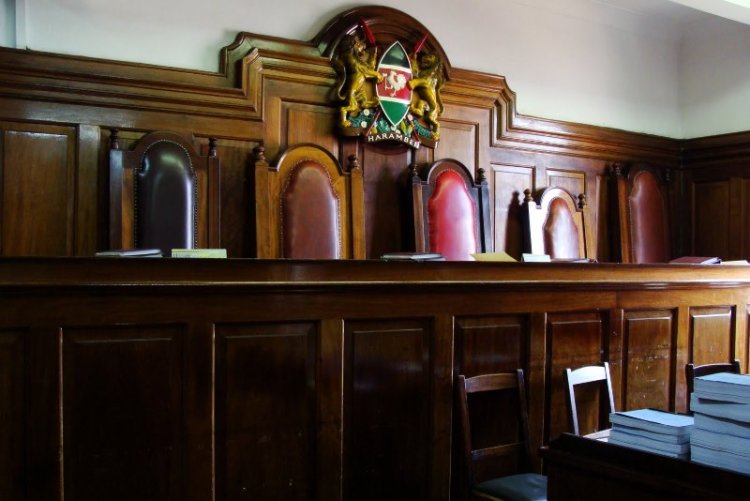Ruto's Possible Similarities To Uhuru Following Attacks On Judiciary
Ruto spent close to 12 minutes accusing unnamed judicial officers of blocking his transformative agenda for Kenya.

President William Ruto's no-holds-barred attack on the Judiciary even though he expressed respect for the institution, sparked memories among some circles of the days when his predecessor, Uhuru Kenyatta was fond of picking verbal battles with judicial officers and expressing disdain for court orders.
On Tuesday, January 2, while speaking during the burial of Michael Waweru, father of Nyandarua Senator John Methu in Nyandarua, the President spent close to 12 minutes accusing unnamed judicial officers of blocking his transformative agenda for Kenya.
He claimed that a select few were misusing the powers of the courts to preserve the status quo and impede inclusive growth, condemning what he termed was "judicial impunity by corrupt judicial officers."
"Our Judiciary, we respect you but judicial impunity by corrupt judicial officers must stop in Kenya. We will stop it, whatever it takes. The Judiciary must submit itself to the constitution and to the people of Kenya," the President committed.

An image of a courtroom in Kenya. /FILE
“We will protect the independence of the Judiciary. But we will not allow selfish individuals to take it captive."
When Ruto was sworn in as the fifth President of the Republic of Kenya, he swore to protect the 2010 Constitution and uphold judicial independence, with his first-ever order being to appoint the six Court of Appeal judges Uhuru had refused to appoint on grounds that there were adverse reports against them from the intelligence service.
During the swearing-in of the Judges at State House in Nairobi, President Ruto said he would do anything within his powers to make sure that the country is governed by the rule of law and not the rule of man.
“Kenya can only be better if we become a country of the rule of law. Anything else leads to anarchy and confusion. We are all equal before the law,” he said then.
“Even as President I have limitations and I should respect them, just like all other arms of government have limitations. We must all live within our mandates… It is the rule of law, not the rule of man.”
But 16 months into his Presidency, Ruto's stance appears to have changed and has now declared war on the judges and judicial officials he terms as “corrupt” and are being used to derail his government agenda through a series of petitions that have prompted the High Court to suspend implementation of his policies.
“Those who are trying to stop me have benefited by working with corrupt judicial officials to ensure that my projects are derailed but I will not be intimidated,” President Ruto said on Tuesday.
“Judicial impunity must stop in Kenya...we will stop it..ati sasa hii barabara mahakama imesema tusijenge...tungoje Judiciary mpaka ituambie tujenge.... bwana PS weka pesa kwa hii barabara tuanze kazi (now they said that the courts ordered that we don't build this road...we wait for the Judiciary to tell us to build it...PS, put money on this road so that we can start working)."
On several occasions, the Judiciary proved unpopular to Uhuru’s administration which resorted to defying court decisions, a move that prompted former Chief Justice David Maraga to call him out.
“They are trying to control the Judiciary...They want to make us puppets...Some CSs are saying I will go before the year ends, kumbe hii Kenya ina wenyewe (Kenya has owners).
"I don’t serve under the mercy of anybody,” Maraga wailed at the footsteps of the Supreme Court in an address that drew lots of mixed reactions.
When the High Court declared his Building Bridges Initiative (BBI) pet project set to change the Constitution of Kenya 2010 unconstitutional, null and void, Uhuru termed it an irresponsible ruling meant to undermine the will of Kenya’s people.
“From nullification of a presidential election in 2017 to an attempt to stop the will of the people as expressed through BBI, the Judiciary has tested our constitutional limits,” Uhuru said then.
“Their decisions must consider the letter of the law, but fundamentally the spirit of the law must also guide them. And I say so because the spirit of the law is the light that will illuminate the burden of the choices they make.”
The courts have not been kind to Ruto, with the 1.5 per cent Housing Levy and the appointment of 50 Chief Administrative Secretaries (CAS) thrown out and the new citizen charges as well as the Social Health Insurance Act halted.
However, on the Housing Levy, the High Court stayed the ruling to allow for the government to appeal the decision. This is set to expire on January 10, 2024.


 admin
admin 




